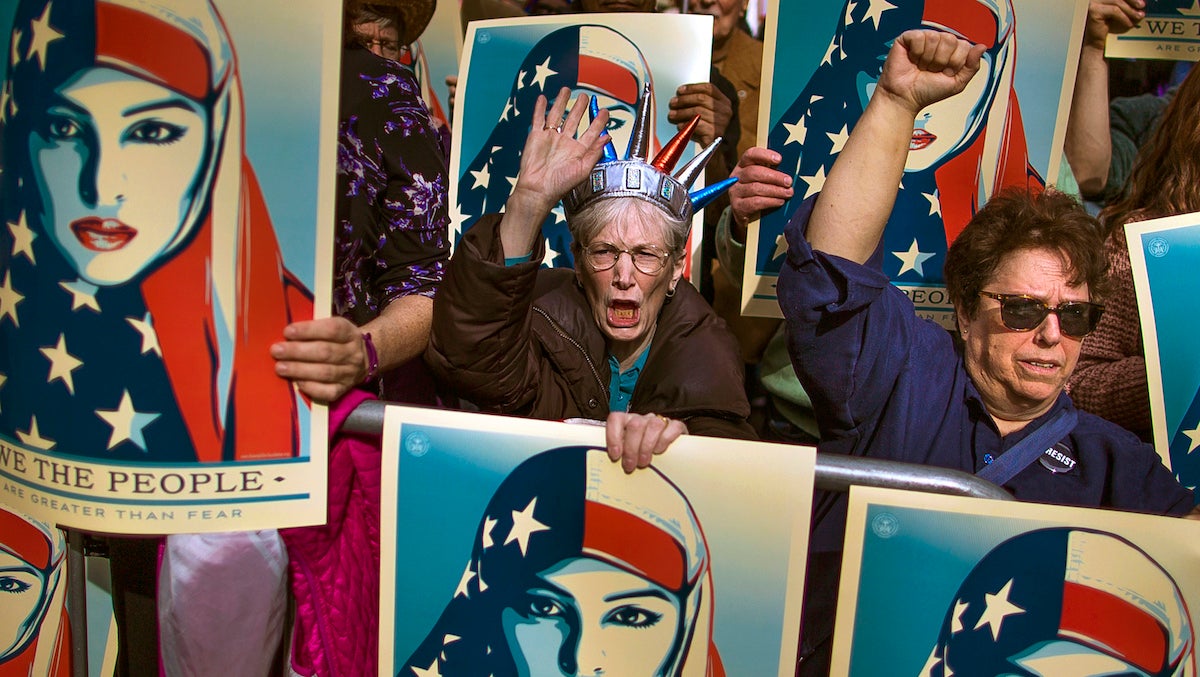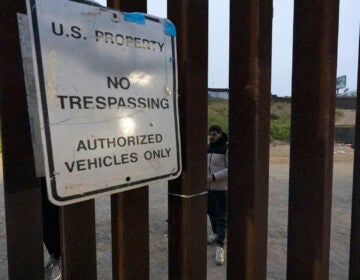Confusion rises over who is ‘eligible’ under Trump’s partial travel ban

FILE - In this Feb. 19, 2017 file photo, people carry posters during a rally against President Donald Trump's executive order banning travel from seven Muslim-majority nations, in New York's Times Square. (AP Photo/Andres Kudacki, File)
The Department of Homeland Security is still developing guidelines for how a partial stay on travel from six Muslim-majority and refugees from across the globe will work, but some groups in Pennsylvania already see the effects.
On Monday, the U.S. Supreme Court accepted a case on President Donald Trump’s executive orders related to these two groups, and mostly lifted an injunction against his controversial immigration policies during the period before the case is heard.
Travelers from Iran, Libya, Somalia, Sudan, Syria, and Yemen will be barred unless they have a “bona fide relationship with a person or entity in the United States,” according to the order. Refugees from across the globe are likewise barred without American ties.
In Allentown, the order means only nine of the 54 refugees the State Department approved Bethany Christian Services to resettle are still eligible, according to Mark Unger, regional director for the refugee resettlement agency.
“That’s the key language, nine people are ‘eligible’,” said Unger. Some of the nine may end up barred. Allentown is home to one of the largest per capita Syrian communities in the country. Bethany has already revised down its expectations for refugees to welcome twice, with the executive orders reducing the refugee quota from 110,000 annually to 50,000.
For others, the impact is less clear cut. “Right now we’re just waiting for more clarity on this issue of bona fide relationships,” said Margaret O’Sullivan, executive director of Nationalities Service Center. Refugees who earn what’s called a “special immigrant visa,” often for supporting US military operations overseas, will not be barred, according to O’Sullivan, whose group assists a number of those visa-holders.
O’Sullivan said the group is planning to receive a family of refugees on Thursday.
“We expect to be able to settle them, but we need more clarity from what this issue (means),” she said.
In January, when President Donald Trump unveiled his executive orders, pandemonium ensued at American airports, as travellers who were expecting entry to the U.S. were turned back. Protesters and attorneys turned out en masse, to advocate for passengers in limbo.
This time, the justices baked a 72-hour delay of implementation into their order, mitigating some of that confusion, said Molly Tack-Hooper, attorney with the American Civil Liberties Union – Pennsylvania. This time, is “similar in that we expect airports to be a bottleneck, but different in that we hope to have more notice” as for who is eligible to arrive before they start their journey.
Advocates across the country challenged the travel ban, on the premise that Trump’s statements during his campaign made it a de-facto ban on Muslims, violating the First Amendment. Others challenged the refugee ban as a violation of the Immigration and Nationality Act.
The government, which is currently evaluating its process for vetting of visitors and refugees as a part of the executive orders, has argued that the policies are a matter of national security. A statement from the Department of Homeland Security (DHS) welcomed the Supreme Court’s decision as “rational and necessary steps to protect our nation from persons looking to enter and potentially do harm.”
The Homeland Security’s statement said it is preparing to implement the ban “professionally, with clear and sufficient public notice, particularly to potentially affected travelers.”
As Thursday, when the 72-hour delay expires, approaches, advocacy groups brace for impact.
“[We] literally have an email drafted, we just need to hit send on, if something needs to be coordinated,” said Tack-Hooper.
WHYY is your source for fact-based, in-depth journalism and information. As a nonprofit organization, we rely on financial support from readers like you. Please give today.




